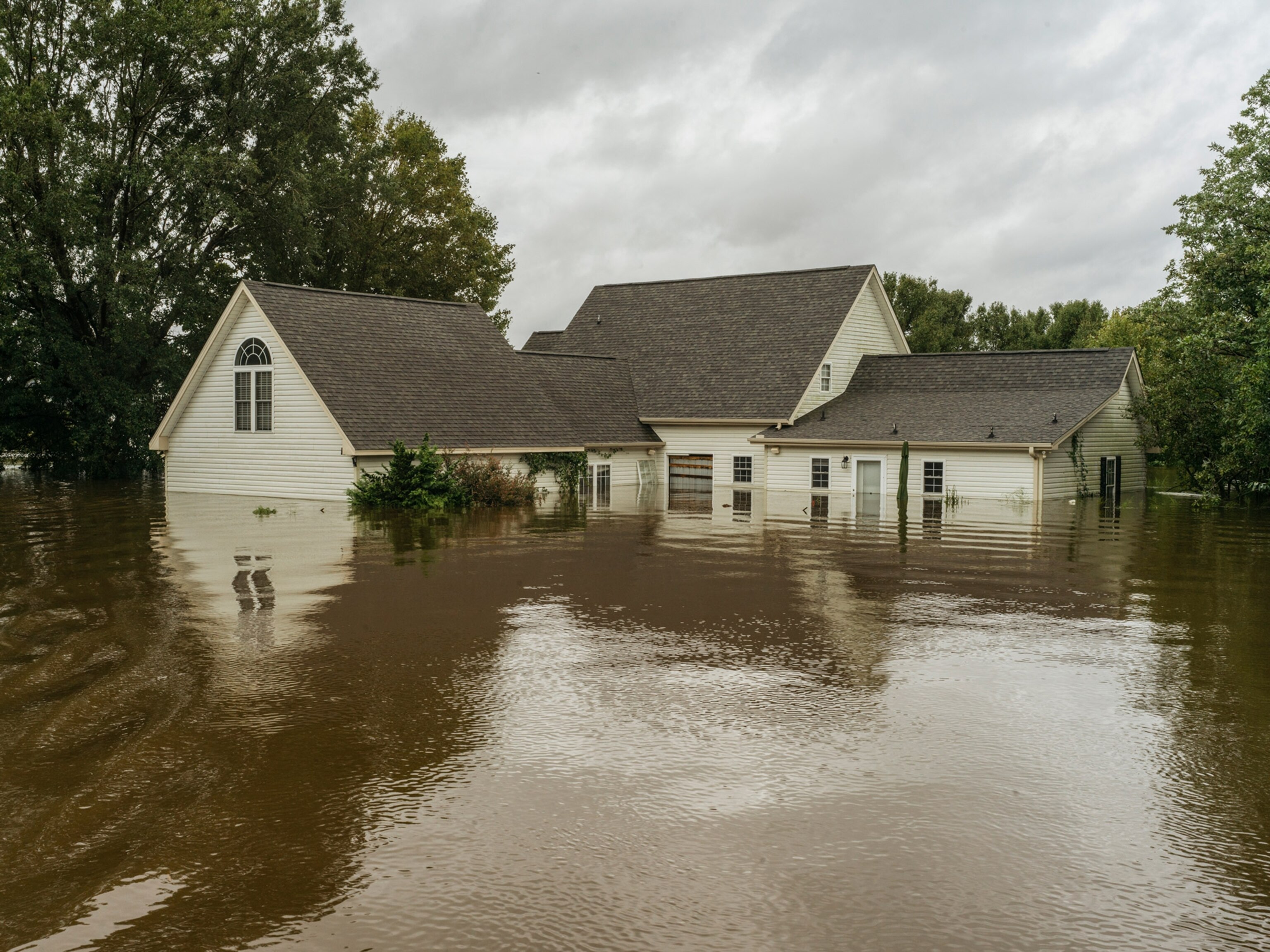
What Forecasters Got Right and Wrong About Florence
The hurricane has caused severe flooding in the Carolinas. Here's what science predicted would happen.

Hurricane Florence’s torrential rainfall has brought catastrophic flooding to much of North and South Carolina, but the convergence of several unexpected factors as the storm was about to touch land kept the hurricane from pounding the coast with devastating winds exceeding 130 miles per hour.
Instead, Hurricane Florence’s peak winds were around 90 mph when it made landfall near Wrightsville Beach, North Carolina September 14. But the storm’s agonizingly slow movement at two or three mph—a person could have walked inland about as fast as Florence moved—allowed it to dump unprecedented rainfall and gave it plenty of time to push a storm surge of about 11 feet up the Cape Fear River and into downtown Wilmington.
Meteorologists say the overall forecasting for Hurricane Florence was very accurate. But the inability to forecast the storm’s last-minute weakening underscores the extreme difficulty of predicting what a massive engine of wind and water is going to do at any given moment. It’s a problem that’s been a puzzlement for as long as people have been looking at the ocean’s horizon and wondering what’s coming.
Hurricane Florence went through several cycles of strengthening and weakening last week as it pounded across the Atlantic Ocean toward its eventual landfall. Hurricanes rarely maintain Category 4 status on the Saffir-Simpson Scale—which rates hurricanes based on wind speed and damage potential—after they move north of Florida. A Category 4 hurricane has maximum winds of 130 mph to 156 mph.
Florence’s peak winds at times exceeded 140 mph, and that was “unprecedented” for a hurricane in that part of the Atlantic, said meteorologist Jeff Masters of the website Weather Underground.
Warm Water Engine
Hurricanes draw their energy from warm ocean water, and Masters said Hurricane Florence reached this intensity because of the unusually warm water in its path.
Bryan Norcross, hurricane specialist for WPLG-TV in Miami, said climate change might be a factor in the warm waters that fed Florence.
“It’s an open question,” Norcross said. (One predictive study suggested a clear link.)
The water in the northern and eastern Atlantic is “significantly warmer than normal,” Norcross said. “Florence happened to take advantage of the (warm) water from Bermuda to the U.S. East Coast.”
Masters noted that the past four years have been the four warmest on record, and the simple presence of this heat could contribute to the warmer Atlantic waters that allowed Florence to intensify.
Florence weakened considerably during its trek to North Carolina when it encountered wind shear—upper level winds that disrupted its momentum and caused its winds to weaken. But it was able to regain its fearsome strength because of the warm water in front of it.
Powerful hurricanes often undergo a phenomenon known as an eyewall replacement cycle. The storm’s eyewall—which surrounds the hurricane’s calm eye—contain the hurricane’s most powerful winds. As the storm intensifies, the eyewall begins to constrict, and a new eyewall can form around the old one. When this happens, it has the effect of throttling the hurricane, and it loses intensity.
If there’s enough warm, open water in front of the hurricane, however, the storm can quickly regain its intensity, and that’s what happened to Florence.
Forecasting whether a hurricane is going to strengthen or weaken is very difficult because the factors that can affect the storm’s intensity are very difficult to detect.
“The factors that affect intensity can’t be measured well,” Norcross said. “They are very subtle, and therefore they can surprise you.”
For example, moist, humid air allows a hurricane to strengthen and maintain its intensity. If a storm encounters drier air, it will quickly cause it to weaken. But forecasters don’t yet have a way to detect whether a hurricane is going to encounter drier air.
Some of the factors that affect a storm’s intensity happen on the ocean surface and are out of reach of even the most sophisticated measuring instruments. Even the spray that is produced by hurricane winds striking the tops of waves can influence a hurricane’s intensity, Masters said.
Hurricane hunter flights gather many types of data when they fly into a storm, but the planes can’t go close enough to the surface to detect what is happening there.
What Forecasters Missed
Phil Klotzbach, a meteorologist at Colorado State University, said that computer models used to forecast hurricane track and intensity didn’t detect the factors that caused Florence to weaken. “The models aren’t perfect,” Klotzbach said. “The smallest feature can affect a storm.”
Norcross said Florence probably encountered drier air as it neared the North Carolina coast, and that caused it to lose some of its intensity. “What can’t be detected by technology today is whether a hurricane will fight off a little bit of dry air,” Norcross said. “What’s a small amount (of dry air) and what’s too much is too subtle to be measured with modern technology.
“It doesn’t take too much to disrupt (the hurricane). Sometimes it rights itself and keeps on spinning; sometimes it doesn’t.”
Masters said the hurricane also encountered shallow, cooler waters as it neared landfall, and that caused it to weaken.
Despite not detecting in advance the factors that caused Hurricane Florence to weaken, Masters and Norcross said the overall forecasting for Hurricane Florence was very good.
“I’ve heard some criticism of the intensity forecasting,” Masters said. “Even so, the National Hurricane Center had been hammering that this was a catastrophic flooding event. It came ashore as a Category 1 storm, but it had a Category 5 impact as far as rainfall goes. The main emphasis was correct, and you can’t fault them for their main emphasis.”
“The forecast track essentially was a perfect forecast,” Norcross said.












